Sports is filled with a bevvy of surprising twists and turns. Little known players plucked deep in the draft or who languish in minor leagues sometimes make it big like Nick Van Exel. Other times, players fulfill the hype surrounding their #1 pick status and routinely exhibit the stuff of legend like Magic Johnson.
Then there are the handful of cases of players gifted beyond belief, who possess talent able to change the course of games, if not the course of The Game, but who never quite ply their skill to the utmost.
That’s the maddening case of point guard Phil Ford.
Before Ford became a professional sensation, he was an amateur prodigy.
This anecdote from Sports Illustrated shows just how wondrous he was.
During his four seasons at the University of North Carolina (1975-’78) Ford was a two-time All-American and would leave the school as its all-time leading scorer. His mark of 2,290 points would stand until Tyler Hansbrough surpassed it in 2008.
As a sophomore, Ford was the starting point guard on the 1976 gold medal winning US Olympic team in Montreal. And in 1978, Ford would collect a treasure trove of awards.
The John Wooden Award
The United States Basketball Writers Association named him their outstanding Division I men’s player
The National Association of Basketball Coaches Player of the Year
The Sporting News Player of the Year
ACC Player of the Year
You have a men’s collegiate basketball award in 1978? You were giving it to Phil Ford.
Holding the #2 overall pick in the 1978 NBA draft, the Kansas City Kings made it abundantly clear they intended to take Ford, if Portland didn’t select him with the first overall pick.
And for his part, Ford made it abundantly clear that he wanted no part in joining the Midwest ball club declaring, “I doubt that you’ll see me in a Kansas City uniform next season.” True to his word, Ford engaged in a holdout after the Kings drafted him, but Kansas City spurned all trade offers.
The contract warfare ended months later at the very end of September as reported by the St. Petersburg Independent on September 30, 1978:
Throughout the negotiations, [Kings General Manager Joe] Axelson was stubborn. When he announced “the door is closed” on possible trade talks involving Ford, he added: “Ford is our property for a year, come hell or high water.”
Donald Dell, a Washington attorney representing Ford, acknowledged the negotiations stalled at first.
“We had some real obstacles earlier in the summer, but we got pretty serious last week,” he said.
Asked why the Kings picked Ford when they knew he might not play for Kansas City, [head coach Cotton] Fitzsimmons said: “We had to draft him and then take our chances from there. We needed to turn this thing around — and I think Phil Ford can do it.”
Ford was KC’s second #2 overall pick in as many years. In 1977 they had taken Otis Birdsong with their lofty position. Both picks were part of a swindling package they got from the then-New York Nets in return for Tiny Archibald. (Archibald played just 34 games for NY before a foot injury knocked him out.)
Fitzsimmons predicted the backcourt duo of Ford and Birdsong would be an all-time great one. Things didn’t turn out that way, but you could forgive Cotton for the optimism.
Hell, you look at this Phil Ford play and tell me you wouldn’t have wet your pants with excitement?
With mesmerizing play like that, Fitzsimmons was right to have faith in the abilities of Ford.
The rookie came out white hot and instantly ignited the low-key tender box that was the KC Kings. With only one playoff appearance since 1968, the Kings franchise was ostensibly moribund, but featured a hidden trove of talent with veteran center Sam Lacey and entering-their-prime forwards Scott Wedman and Bill Robinzine.
And of course there was Ford’s backcourt mate Birdsong, whose offensive game was as melodic as his name. The two indeed formed an undersized guard tandem (Ford was 6’2”; Birdsong 6’3”) that was nigh unstoppable. Birdsong averaged 21.7 PPG, 4.3 RPG, 3.4 APG. Ford was stupendous with 15.9 PPG, 8.6 APG, and 2.2 SPG.
The Kings improved by 17 wins over the previous year to finish the 1978-79 season 48-34. This was good enough to win the Midwest Division crown, the only time between 1952 and 2002 that the franchise won its division.
Ford’s potency was on full display during a pair of February games that season.
On February 21, 1979, the Kings hosted the Milwaukee Bucks. KC easily won the game, 133-117, with Ford scoring 26 points, dropping 22 dimes, and making five steals. The 22 assists tied Oscar Robertson’s franchise record and still stands today.
The next day, February 22, Ford had a ho-hum 22 points and six assists in a 111-107 loss to the Cleveland Cavaliers. But on February 23, he struck the Phoenix Suns something fierce: 22 points and 21 assists.
So, that’s two 20+ assist games during a back-to-back-to-back sequence of contests. Told y’all Phil Ford was a bad, bad man.
Although unselected for the All-Star Game, Ford would garner a much more prestigious place on the All-NBA 2nd Team (and of course the All-Rookie Team). He also ran away with the Rookie of the Year award, garnering 62 of the 66 votes.
Coach Fitzsimmons was Ford’s unofficial hype man. Quoted in the Wilmington Star on May 17, 1979, he praised Ford as “the best point guard playing basketball.”
“And if he’s the best in this era,” said Kansas City King coach Cotton Fitzsimmons, “he’s probably the best ever…. Phil is one of those rare kinds of players who can jump up in the air, spot three guys open, and always give the ball to the guy with the hot hand – or give it to the best shooter[.]”
For his part, Ford had completely changed his tune from the previous summer’s holdout. “I was very lucky,” he said. “I played for the best coach in the NBA and the other guys on the team were tremendous.”
Despite the exciting regular season, the Kings would get pummeled mercilessly by the 50-win Phoenix Suns in the playoffs, setting up the first of three straight postseason matches between the clubs.
After splitting the first two games of the series, Phoenix would blow the Kings out by 15, 14, and 21 points respectively in the final three games. Ford played terribly all series as he was harassed by Phoenix’s defensive ace, Don Buse. The disruptive Suns guard helped force the rookie King into averages of just eight points and six assists per game along with 26% FG for the five-game series.
But Buse was one of the best defenders ever and Ford was just a rookie. Better times lay ahead, right?
The 1979-80 season was nearly a replication for both, Ford and the Kings. Which meant great stuff.
In a November game versus the Philadelphia 76ers, understandably more famous for Darryl Dawkins shattering the backboard, Ford scored a career-high 34 points in a 110-104 Kings win.
Just two days later, on November 13, 1979, Ford tied the mark as he led KC to a 114-108 win over the Los Angeles Lakers. Ford posted 11 of his 34 points in the fourth quarter.
And just a few days after that (Nov. 21), Ford took it to the Kings’ nemesis as he had a new career-high of 35 points against the Suns. However, Phoenix won the game, 128-120.
In total, Ford’s numbers largely remained the same from his rookie season. The biggest change was his admirable reduction in turnovers from 4.1 a game in 1979 to 3.4 in 1980. Despite the maturation in ball-handling, Ford would receive no league-wide honors this season. And everyone’s attention went to a new dazzling point guard, Magic Johnson.
Finishing with 47 wins the Kings again got a date with Phoenix in the playoffs.
In the first round, best-of-three mini-series, Ford showed more spark than he had the previous year, but Buse continued to demonize him. In Game 1, Buse held Ford to just two points until the final four minutes when Phil uncorked 12 points in a furious attempt to erase a 17-point deficit. The Kings’ rally fell just short and they lost the game, 96-93.
KC won Game 2 at home, 106-96. Ford was splendid with 18 points and 13 assists setting up Birdsong (30 points) and Wedman (32 points) for buckets galore. However, in the decisive Game 3, Phoenix ran the Kings out the gym, 114-99.
For the series, Ford averaged 17.3 PPG, 8.7 APG, 1.7 SPG, .465 FG%, and .818 FT%. Major improvements over the previous year.
For his third season, Ford was steady and great as ever in his production: 17.5 PPG, 8.8 APG, and 1.5 SPG, although his turnovers ticked up again to 3.7 a game.
However, Ford played in just 66 games thanks to a broken orbital bone suffered in February 1981. World B. Free was the accidental culprit when his thumb went into Ford’s eye. The force was so powerful that Free’s thumb was dislocated, so you can imagine how screwed up Ford’s eye was.
The resulting surgery and recovery cost him the rest of the season and he wouldn’t rejoin the Kings until late in their playoff run.
With fellow starting guard Birdsong going down injured as well, the Kings stumbled to a 40-42 record that season but survived 2-1 against Portland in the first round mini-series, which featured two overtime games and an average margin of victory of just 5 points.
The Kings would next exorcise their demons by finally smiting the 57-win Suns in a seven-game second round thriller. The Kings nearly blew a 3-games-to-1 series lead, but a win’s a win! Stinks Ford wasn’t around to help KC push the Suns out the way and send Buse home.
Ford finally rejoined the team for their Western Conference Finals—an absurd showdown with the Houston Rockets who were also 40-42 in the regular season.
But there was trouble for KC.
With the extended absences of Ford and Birdsong, the Kings dialed down their uptempo approach and became a more plodding team. Without their speedy guards, forwards Wedman, Ernie Grunfeld, and Reggie King took on more playmaking duties. And since the bigger, slower lineup had worked, coach Fitzsimmons kept going with it generally.
It was hard enough to come back from a months’ long lay off from the eye injury that impacted his vision, but Ford now had to adjust to the team’s new style. Given the circumstances, Ford averaged a respectable eight points and six assists in 31.6 minutes per game.
But the Rockets had Moses Malone, who was on a mission (27.4 PPG, 14.6 RPG), and beat the Kings in five games.
Still, Kansas City making the conference finals despite their injuries and jerry-rigged lineups was supremely impressive.
This high-water mark of team success was where Ford’s NBA journey began taking a turn for the worse.
Despite having declared Ford the best point guard in the NBA in 1979, Fitzsimmons’ Kings traded for second-year point guard Larry Drew in August 1981. Maybe they were just looking for backup help after they had none in the previous year’s playoffs, but the game logs were ominous for Ford as he continued to struggle with his vision.
Ford played in 72 games (starting in 65 of them) but averaged just 27.1 minutes, 9.9 points, and 6.3 assists per game. Drew meanwhile appeared in 81 games (starting 19) and averaged 24.4 minutes, 10.8 points, and 5.2 assists per game.
As Ford and Drew swashbuckled for the point guard job, the team plummeted to just 30 wins. A huge factor was losing Wedman in free agency to the Cavaliers and giving up Birdsong in a sign-and-trade with the Nets. Just days into the 1981-82 season, the Kings also traded linchpin center Sam Lacey to the Nets for guard Mike Woodson.
All this turnover pointed toward a rebuild in KC and despite being just 25 years old and in his fourth season, Ford wasn’t part of the long-term plans.
Deciding Drew was their man at point, the Kings traded Ford to New Jersey after the 1981-82 season. (Was there a freaking batphone connecting the Kings’ and Nets’ GMs?)
Seven games into the 1982-83 season, the Nets traded Ford to Milwaukee. His stint with the Bucks lasted only that season. For the 1983-84 campaign, Ford caught on with the Rockets, who had the promising Ralph Sampson as a rookie, and hoped to resurrect his career.
In this period, Ford was dogged by accusations of alcoholism, which he denied, and questions concerning his work ethic and ability following the eye injury.
This Associated Press article from February 1984 addresses these issues and more.
Ford sounded positive. “I went back to Chapel Hill and got into the best shape I’d ever been in,” said Ford. “I went in and talked to Coach [Dean] Smith and he asked me what I wanted to do with the rest of my life.” Phil responded he wanted to play basketball and thus committed himself to the gym more than ever.
Ford was still with Houston for the beginning of the 1984-85 season, but in December he was cut by the Rockets, who insisted he’d remain with the club as a scout. Yet by the fall of 1986 Ford was trying for a comeback with the Golden State Warriors. By mid-October, the plan was over as the Warriors waived him. 30 years old and the former Rookie of the Year had been fighting tooth and nail for four years to keep a spot in the NBA.
Just sucks that an accidental poke in the eye from World B. Free could do so much damage and essentially send this spark plug’s career in a tailspin.
Now it’s time for Arbitrary Statistical Plateau to show what was lost.
Ford’s rookie average of 8.6 assists per game ranks fifth all-time for first-year players. The guys ahead of him are Mark Jackson, Oscar Robertson, Damon Stoudamire, and Tim Hardaway.
He is one of only eight players to average 16 points, eight assists, and 1.5 steals per game over the course of their first three seasons. And he was the first one to do it.
The others? Oh, some cats by the names of Magic Johnson, Isiah Thomas, Tim Hardaway, Chris Paul, John Wall, and Ben Simmons plus the mighty mouse, Damon Stoudamire.
In the NBA Phil Ford was a blindingly bright, brilliant flash in the pan… but a flash in the pan, nonetheless.
Just one of the unfortunate truths about sports.
PS—An undisputed truth is that Ford is the best 360 layup artist in basketball history
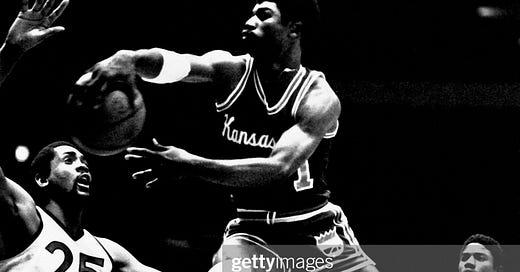


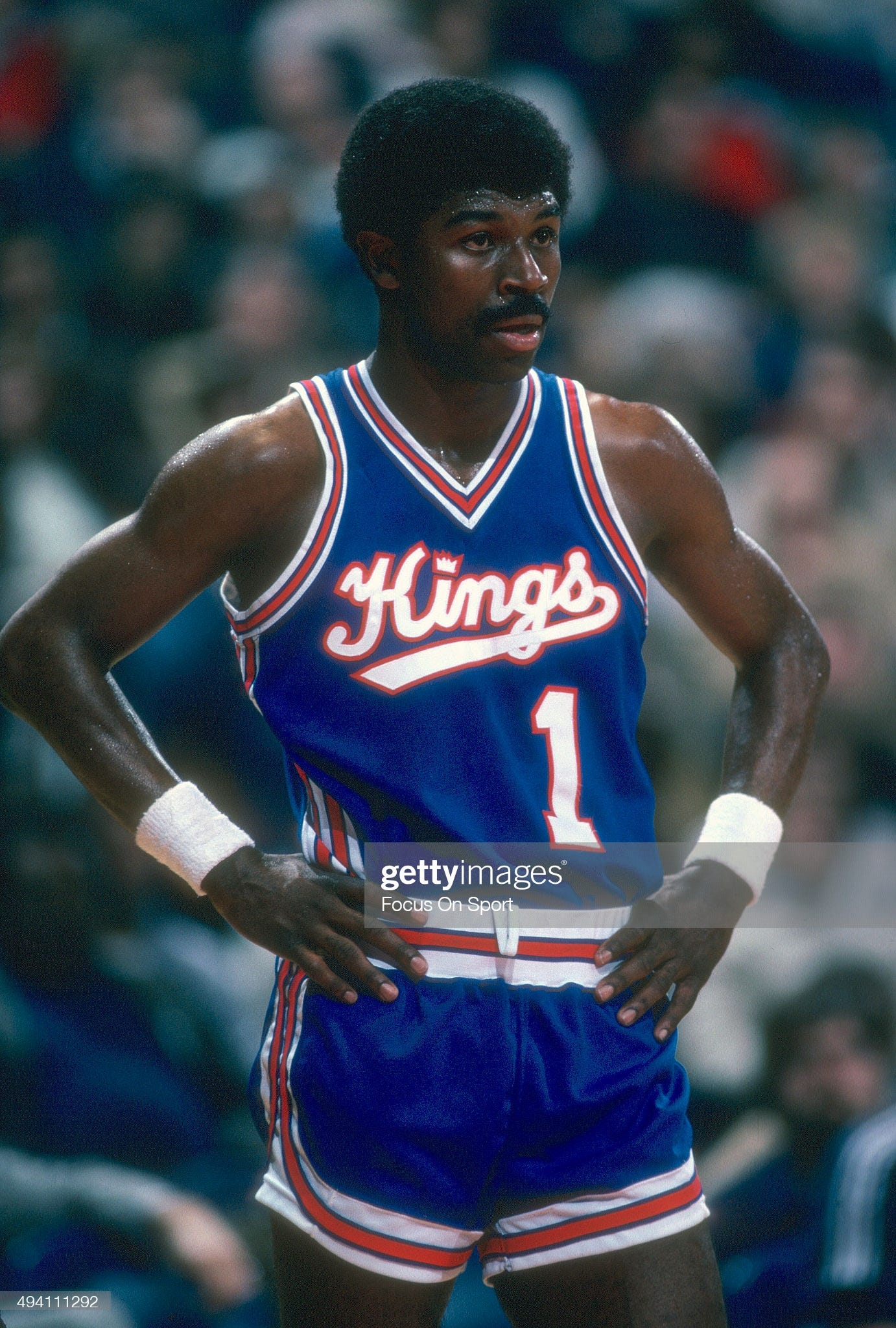
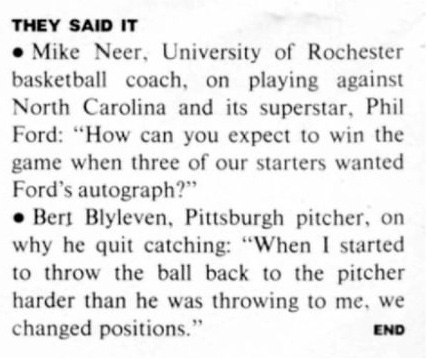


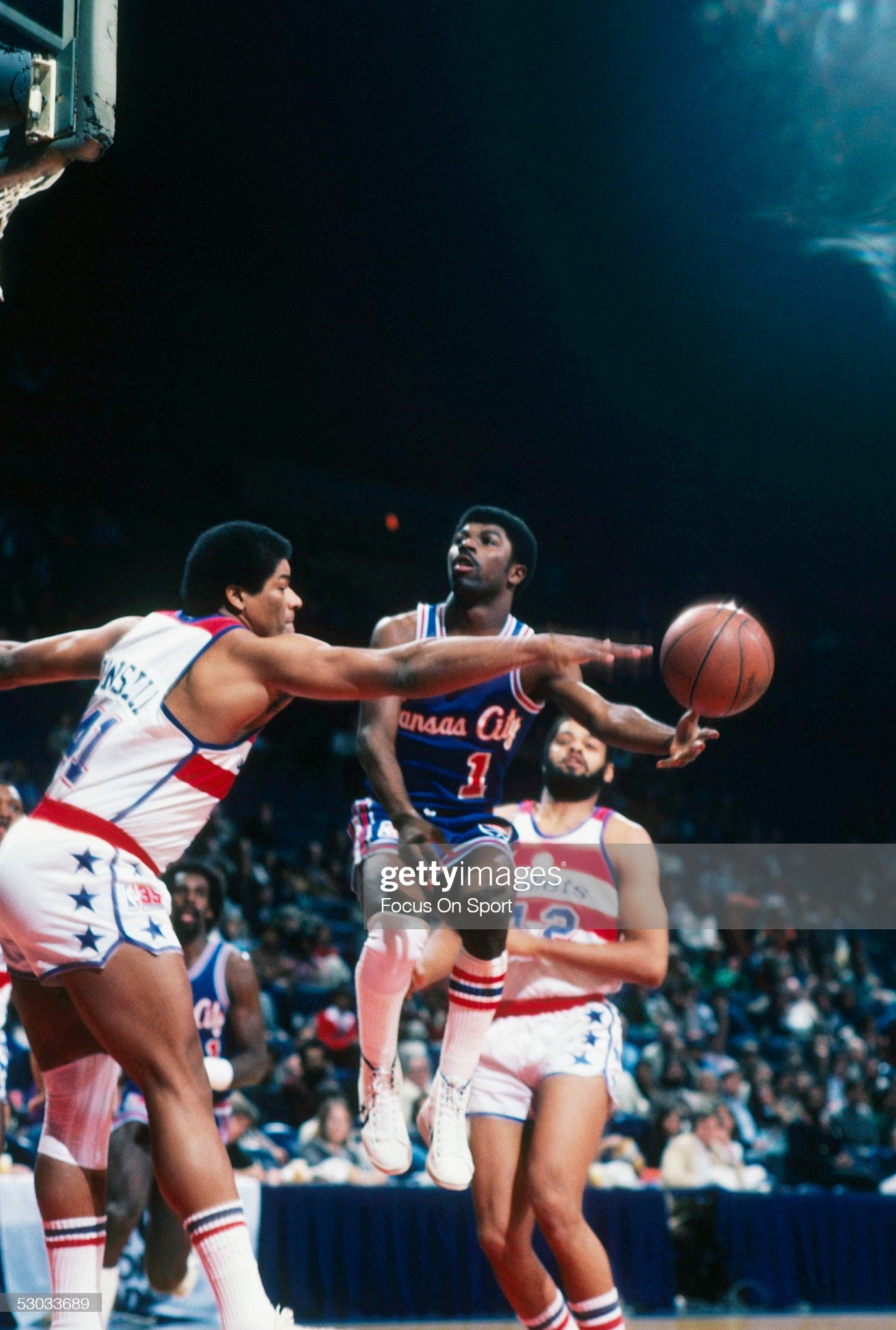
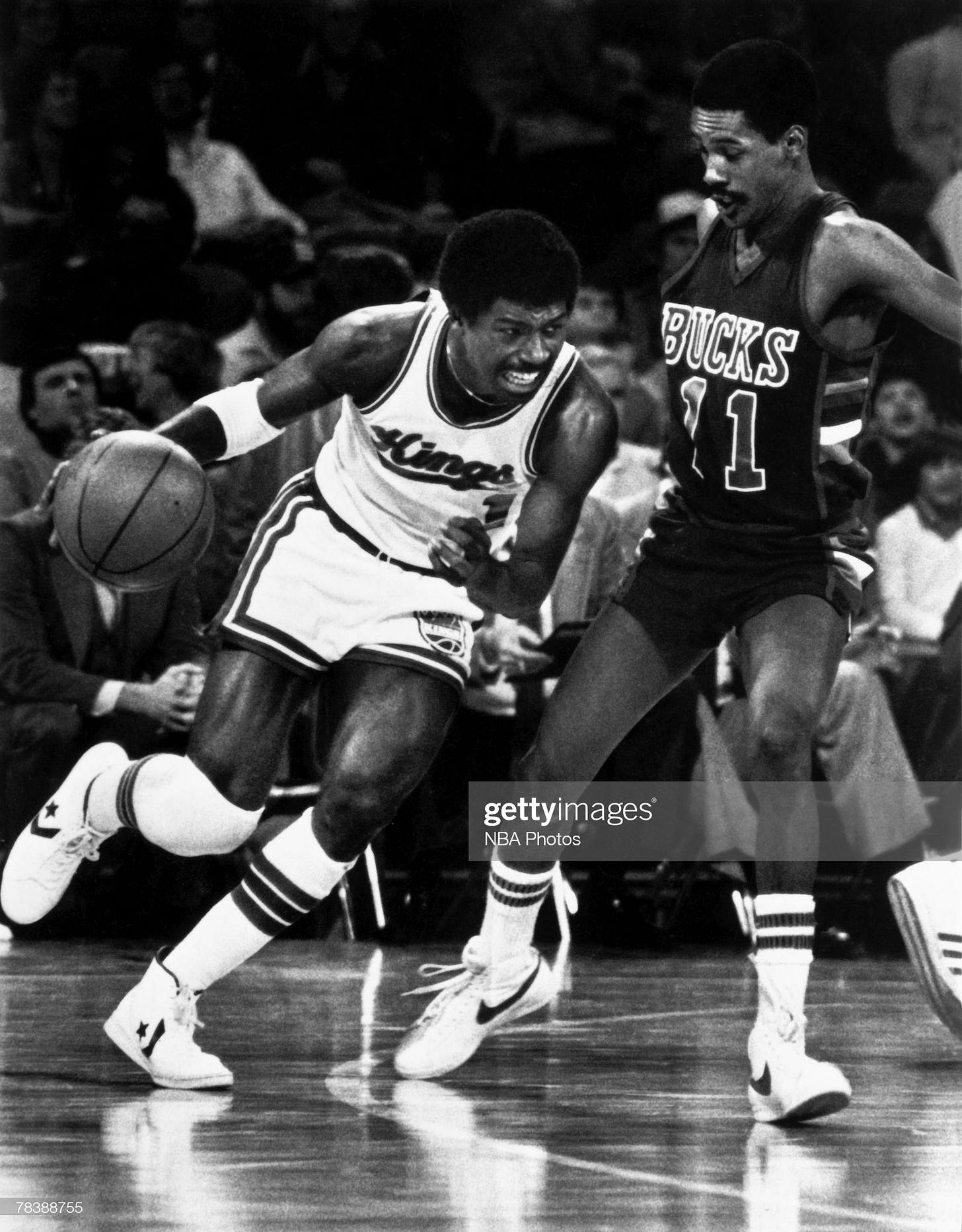
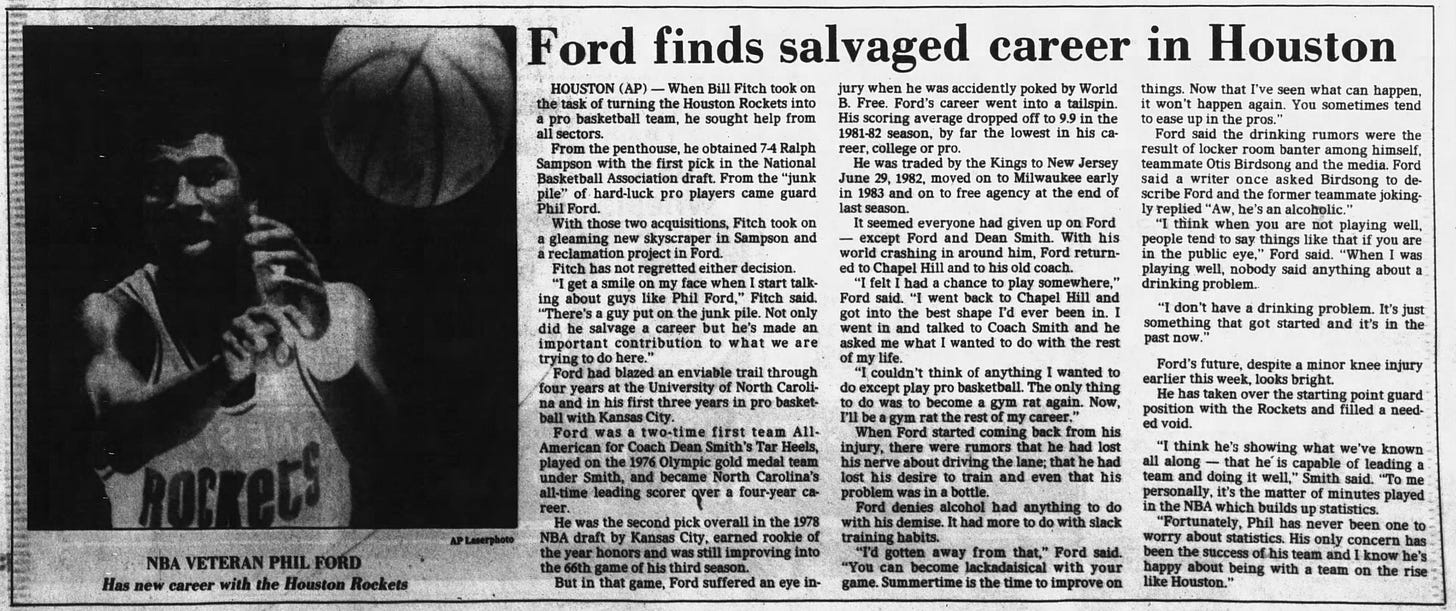
"Coach Cotton Fitsimmons, goin' down on that towel!"